
By
Raphael Santos
August 9, 2023
Updated
September 12, 2023
Source: Frame Stock Footage/Shutterstock
Discover the in-demand tech skills, hottest work hubs, and top educational programs
AI engineering is a highly sought-after role in today's industry. And this goes beyond the tech sector. Many companies are creating job opportunities for this new technology, leading to competition among clusters to attract highly skilled professionals.
Certain cities have a high per-capita density of AI engineers. Dublin has the highest density of AI talent among European cities, with 17% of all software engineers being in this field. Zurich is also noteworthy with 14%, and and Athens is slightly behind with 13%.
Dublin is at the top because it is a welcoming hub for tech giants, partly due to its favourable tax regime for research and development and the availability of a large pool of high-tech talent.
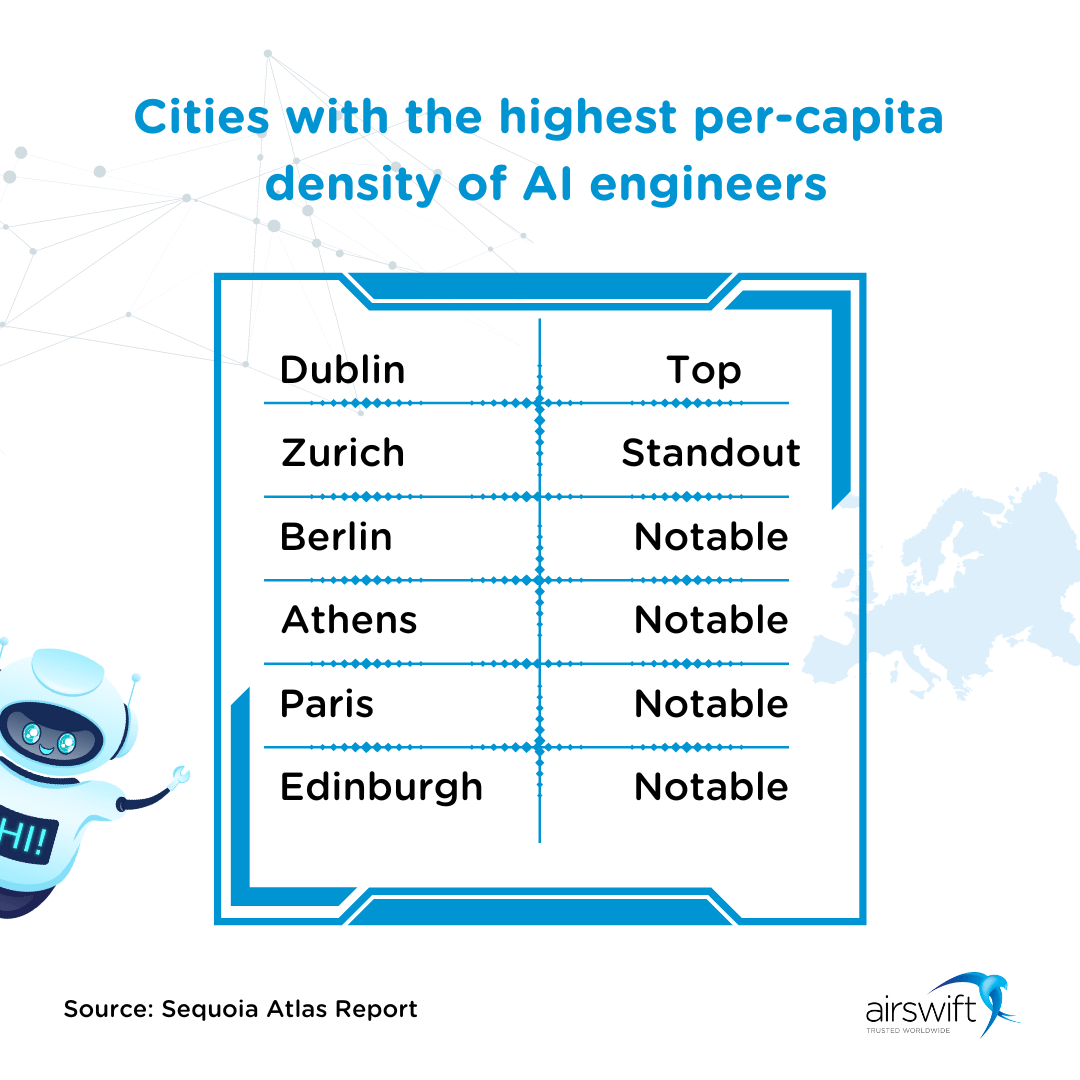
In this article, we will explore the key steps and skills necessary to embark on a rewarding career as an AI engineer. Whether you are a student considering your future career path or a professional looking to transition into the field, this guide will provide you with valuable insights and resources to kickstart your journey as an architect of tomorrow.
What is the role of an artificial intelligence engineer?
Artificial intelligence (AI) engineering is a field that combines computer and data science to develop systems and disruptive technologies that can simulate human intelligence. AI engineers design and build algorithms, models, and systems that enable machines to learn from data and make logical decisions.
With the increasing demand for AI-driven solutions in industries such as healthcare, finance, and technology, becoming an AI engineer offers a promising career path with ample opportunities for growth and innovation.
Overview of AI engineering career paths
From AI engineers to AI research scientists and machine learning scientists, these roles contribute to the dynamic and impactful nature of the field.
AI engineers are responsible for developing and implementing AI systems, utilising their technical skills to design, build, and maintain AI models and neural networks. They work closely with data scientists and collaborate with cross-functional teams to ensure AI solutions meet the needs of businesses and customers.
AI research scientists focus on advancing the frontiers of AI technology. They explore new algorithms, machine learning techniques, and statistical analysis methods to improve AI systems' capabilities. With a strong understanding of AI models and a solid knowledge of statistics, they work towards creating cutting-edge AI solutions.
Machine learning scientists play a crucial role in developing and fine-tuning machine learning models. They have a deep understanding of algorithms, data processing, and predictive modeling. By applying their in-depth knowledge and practical experience, they create models that enable tasks such as speech recognition, image processing, and even self-driving cars.
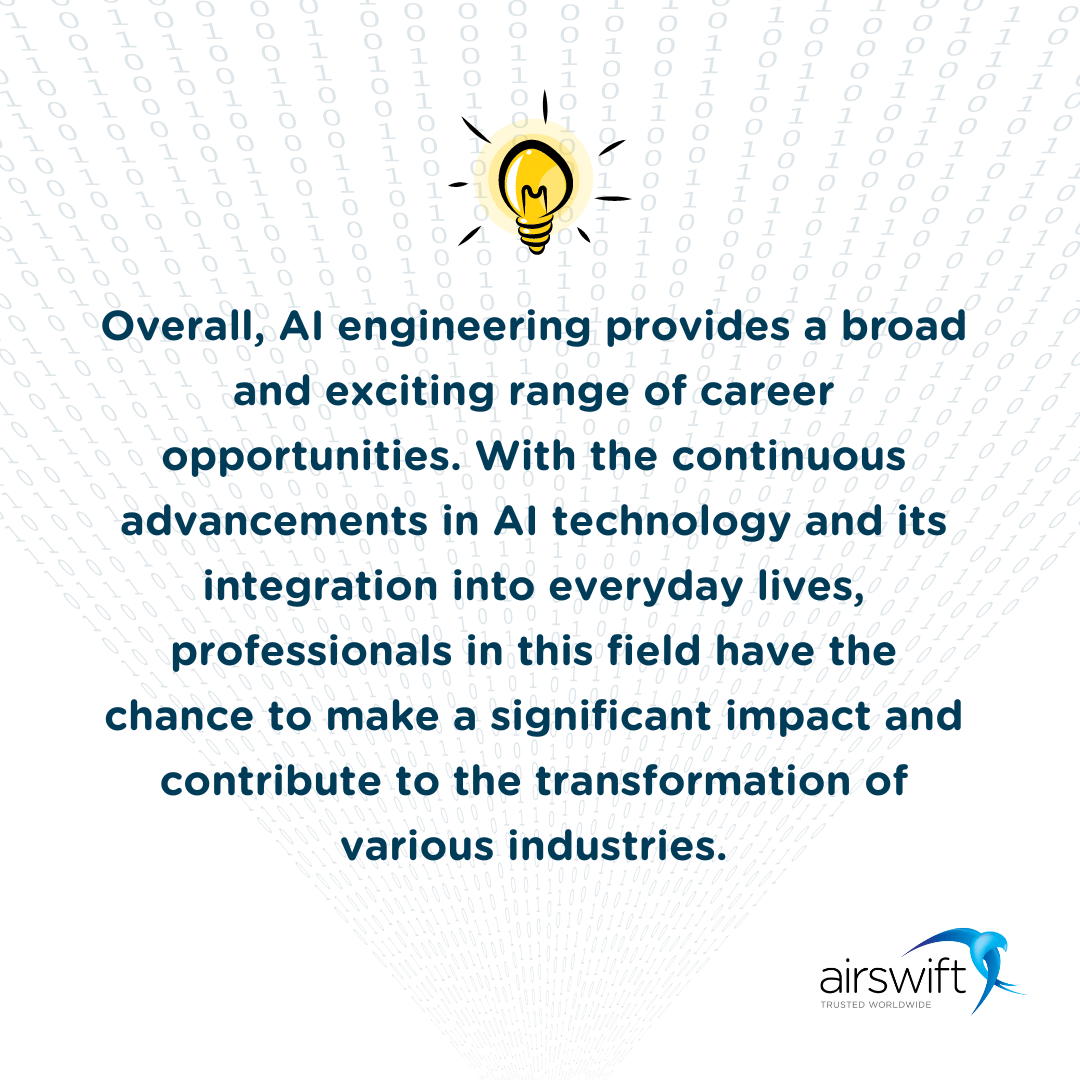
Technical skills required for AI engineers
A wide range of technical skills is needed for AI engineers to effectively design and build AI systems that have a transformative impact on businesses and our everyday lives.
Here are some of the skills you’ll need to master to become an Ai engineer.
Programming languages
An essential skill of AI engineers is proficiency in programming languages. There are several programming languages commonly used in AI engineering, including Python, Java, C++, Lisp, and R.
Python is often considered the go-to programming language for AI development. It offers a simple and clear syntax, making it easy to learn for beginners. Additionally, Python has a versatile nature and a large library of tools and frameworks specifically designed for AI tasks. This makes Python an ideal choice for building and implementing AI algorithms and models.
However, it is important to note that becoming proficient in at least one programming language is crucial for AI development, regardless of the specific language. Each programming language has its own strengths and weaknesses, and choosing the right one depends on the specific requirements of the AI project.
Linear regression
Linear regression is an important concept in the field of AI engineering as it provides a foundation for data analysis and modeling the relationship between variables.
In AI, linear regression is commonly used to predict and understand the correlation between input and output variables. It helps in identifying trends, patterns, and relationships in datasets.
The key steps involved in performing linear regression are data collection, data preprocessing, model training, and evaluation.
Data collection involves gathering relevant data points that represent the variables of interest. The data then needs to be preprocessed, which includes handling missing values, removing outliers, and scaling the data if necessary.
Next, the model is trained using the preprocessed data. The goal is to find the best-fitting line that minimises the difference between the predicted and actual values. This process involves estimating the model's parameters using techniques such as the least squares method.
Finally, the model is evaluated to assess its performance and accuracy. This is done by analysing various metrics like mean squared error, root mean squared error, and coefficient of determination (R-squared).
Neural networks and deep learning models
Neural networks and deep learning models are powerful tools in the field of artificial intelligence (AI). They are inspired by the functioning of the human brain and are widely used for pattern recognition, facial recognition, and handwriting recognition.
These networks consist of interconnected nodes known as artificial neurons or perceptrons. They receive input data, process it using weighted connections, and produce output. Deep learning models, on the other hand, are a type of neural network that have multiple layers of interconnected neurons.
Neural networks mimic the functionality of the human brain by learning from examples. They are trained on large amounts of data and can recognise patterns and relationships in the input data. This makes them particularly useful for tasks such as facial recognition, where they can identify specific features and match them to known faces. They are also used for handwriting recognition, where they can analyse the shape and structure of handwritten characters.
The applications of neural networks extend beyond just pattern recognition. They have found commercial and business applications in various industries. For example, in finance, neural networks are used for stock market prediction and fraud detection. In healthcare, they are used for medical image analysis and disease diagnosis. In marketing, they are used for customer segmentation and demand forecasting.
Natural language processing (NLP)
Natural language processing (NLP) is a key concept in the field of AI engineering that focuses on enabling computers to understand, interpret, and generate human language. With NLP, AI systems are able to process and analyse textual data, enabling them to comprehend and respond to human language in a more natural and intelligent way.
AI engineers use various NLP libraries and tools to facilitate the development of NLP models and applications. Some popular libraries include:
- NLTK (Natural Language Toolkit)
- Sentiment Analytics
- Gensim
- TextBlob
- CoreNLP
These NLP libraries and tools provide AI engineers with the necessary means to process and understand human language, allowing them to build sophisticated NLP models and applications.
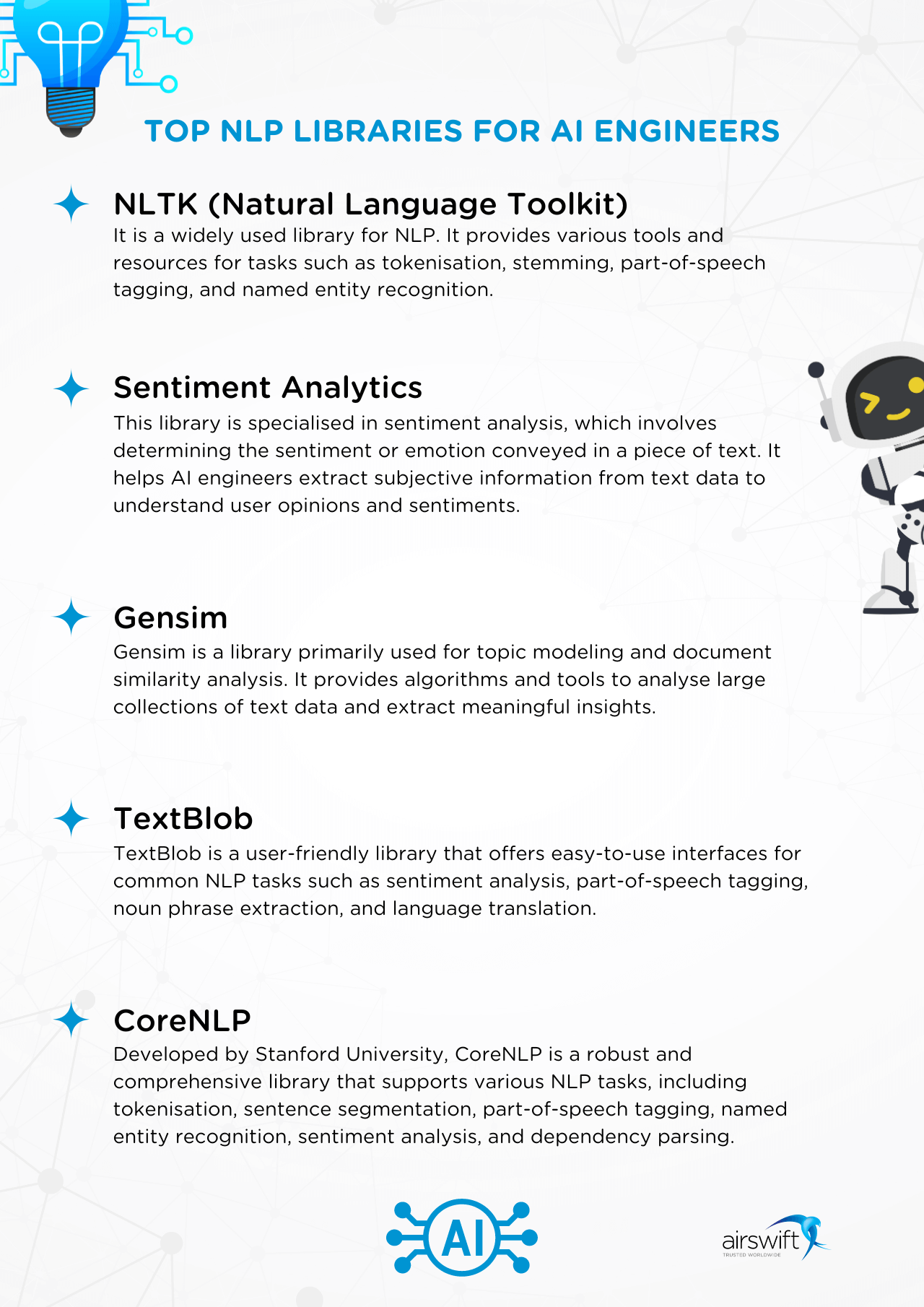
This knowledge and skill set is vital for AI engineers working in fields such as chatbots, virtual assistants, text analytics, and many other AI-driven applications.
Application program interfaces (APIs)
APIs are important in AI engineering because they allow engineers to interact with external systems and utilise pre-built tools and models. They provide a standardised method for software components to communicate with each other and act as a bridge between different systems.
By using APIs, AI engineers can access and leverage pre-built tools and models developed by experts, saving time and effort in the development process. This allows for faster development cycles and increased efficiency.
Understanding human intelligence vs. machine learning
Human intelligence encompasses a vast array of cognitive and sensory abilities that enable individuals to perceive, reason, learn, and make decisions. It is deeply rooted in the biological processes of the human brain, which allows for complex thinking, problem-solving, and adaptability. Human intelligence is not limited to a specific set of skills or knowledge but is flexible and can be applied to a wide range of tasks and contexts.
On the other hand, machine learning is a subset of artificial intelligence that focuses on the development of algorithms and mathematical models that enable machines to learn from data and make decisions without being explicitly programmed. Machine learning algorithms analyse vast amounts of data, identify patterns, and make predictions or take actions based on that information.
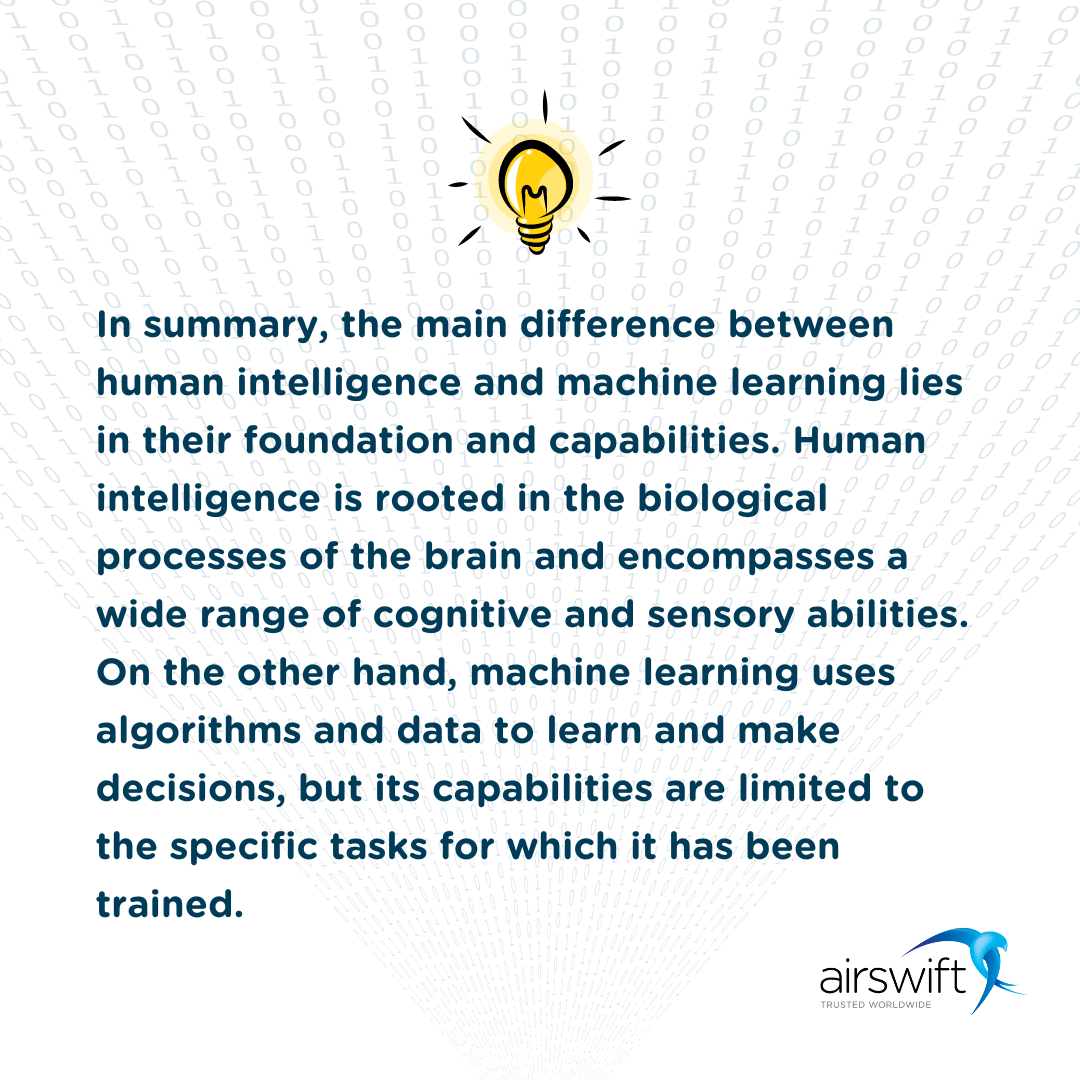
Soft skills needed for successful AI engineers
In addition to technical skills, successful AI engineers also require a set of soft skills to thrive in their roles. These skills are essential for effective communication, collaboration, and problem-solving.
Communication skills
AI engineers often work collaboratively with stakeholders such as data scientists, developers, and business professionals. Establishing good rapport with these individuals is essential for effective teamwork and project success. Effective communication fosters the exchange of ideas, enables the alignment of goals, and promotes a shared understanding of the AI project's objectives.
Creative problem-solving abilities
To foster creativity, AI engineers often rely on rapid prototyping and iteration techniques. They quickly generate ideas and build working prototypes to test and refine their concepts. This iterative process allows them to learn from failures and continuously improve their solutions. By embracing this approach, AI engineers can develop more robust and effective AI models and applications.
Adaptability to rapidly changing technology landscape
Adaptability is particularly important as AI technology is being leveraged in various industries and sectors. Manufacturing companies are integrating AI systems into their production processes to improve efficiency and productivity. E-commerce platforms are utilising AI algorithms for personalised product recommendations and targeted marketing.
In the entertainment industry, AI is used for content creation and recommendation systems. The food and healthcare sectors are using AI for precision medicine and drug discovery. Gaming companies are incorporating AI for realistic virtual environments, and retailers are applying AI for inventory management and customer service.
Education required to become an AI engineer
To become an AI engineer, a combination of formal education, experiential training, and additional credentials is typically required. Here's what you need to know about the educational requirements to pursue a career in this field:
- Degree types: A bachelor's degree in computer science, mathematics, or a related field is often the minimum requirement. However, pursuing a master's degree or a Ph.D. in Artificial Intelligence, Machine Learning, or a similar discipline can enhance your prospects.
- Study length: The length of study depends on the degree pursued. A bachelor's degree typically takes around 4 years, while a master's degree can range from 1 to 2 years. A Ph.D. program can take an additional 3 to 5 years or more.
A potential option for a first course could be the professional program offered by IBM, which is accessible on Coursera:
IBM AI Engineering Professional Certificate | Coursera
Top-notch universities and bootcamps offer courses that can help aspiring AI engineers gain the necessary skills and knowledge. Some of the top courses include:
1. "Artificial Intelligence" offered by Stanford University.
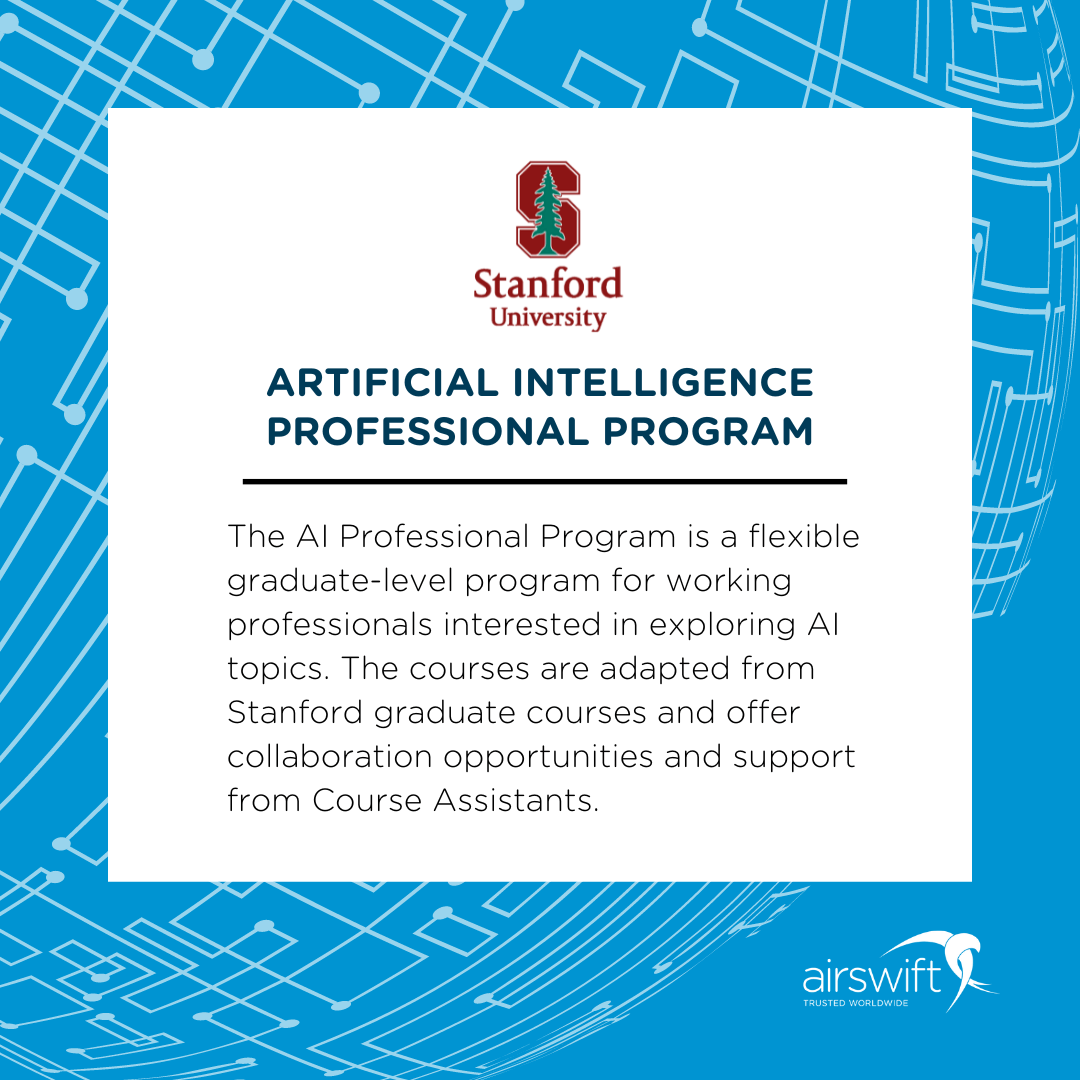
2. "Deep Learning Specialisation" offered by deeplearning.ai on Coursera.
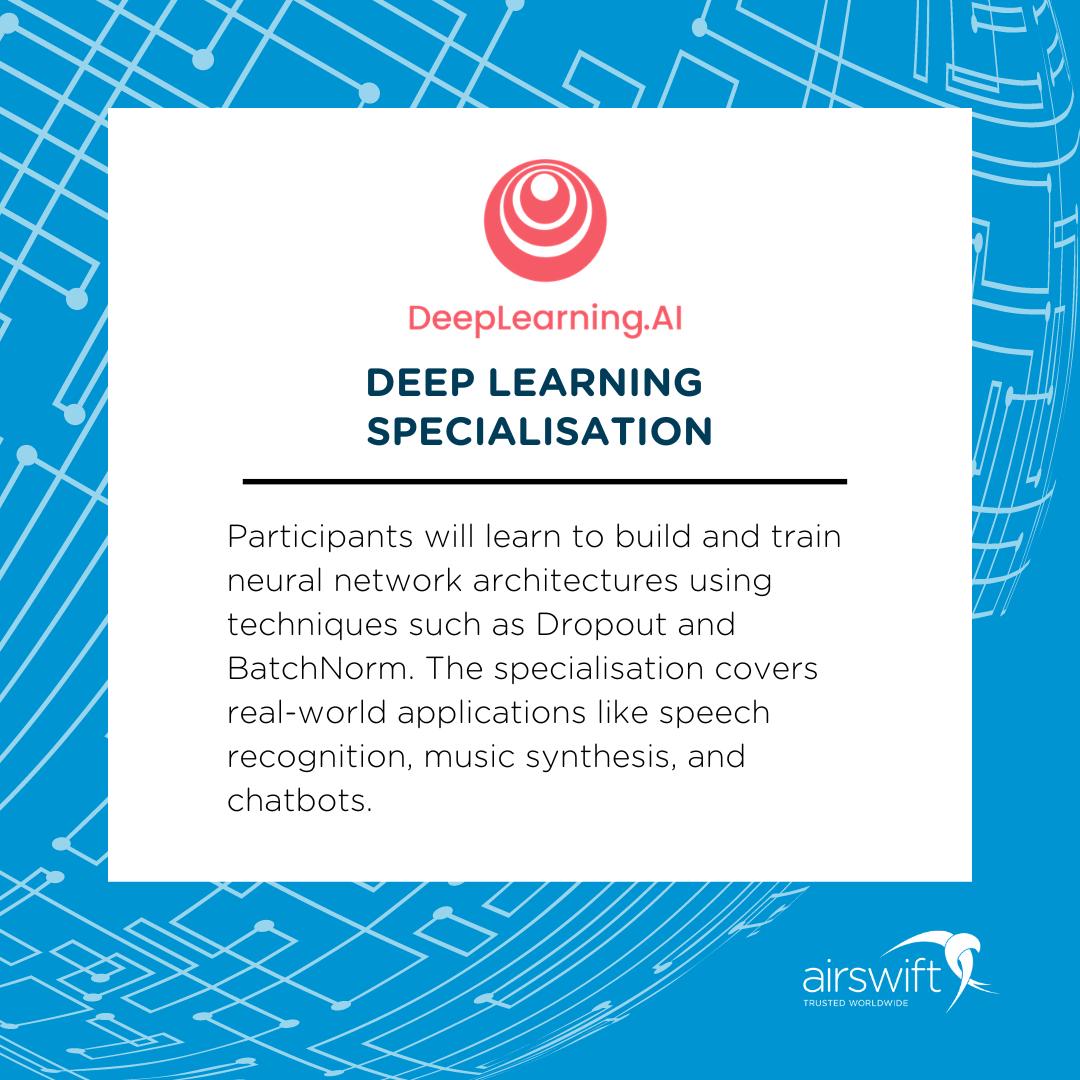
3. "Machine Learning" offered by Columbia University on edX.
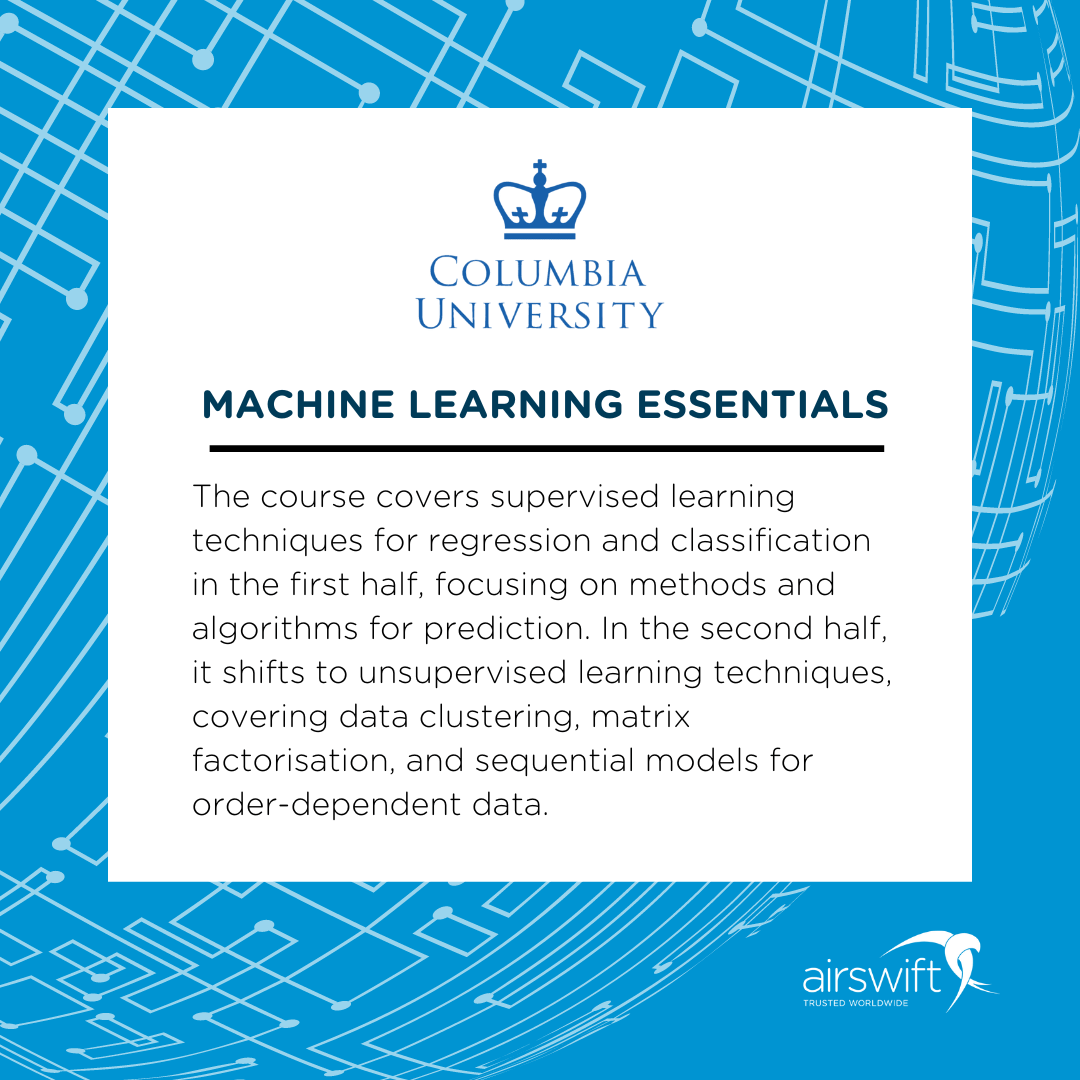
4. "Deep Learning: Mastering Neural Networks" offered by Massachusetts Institute of Technology.
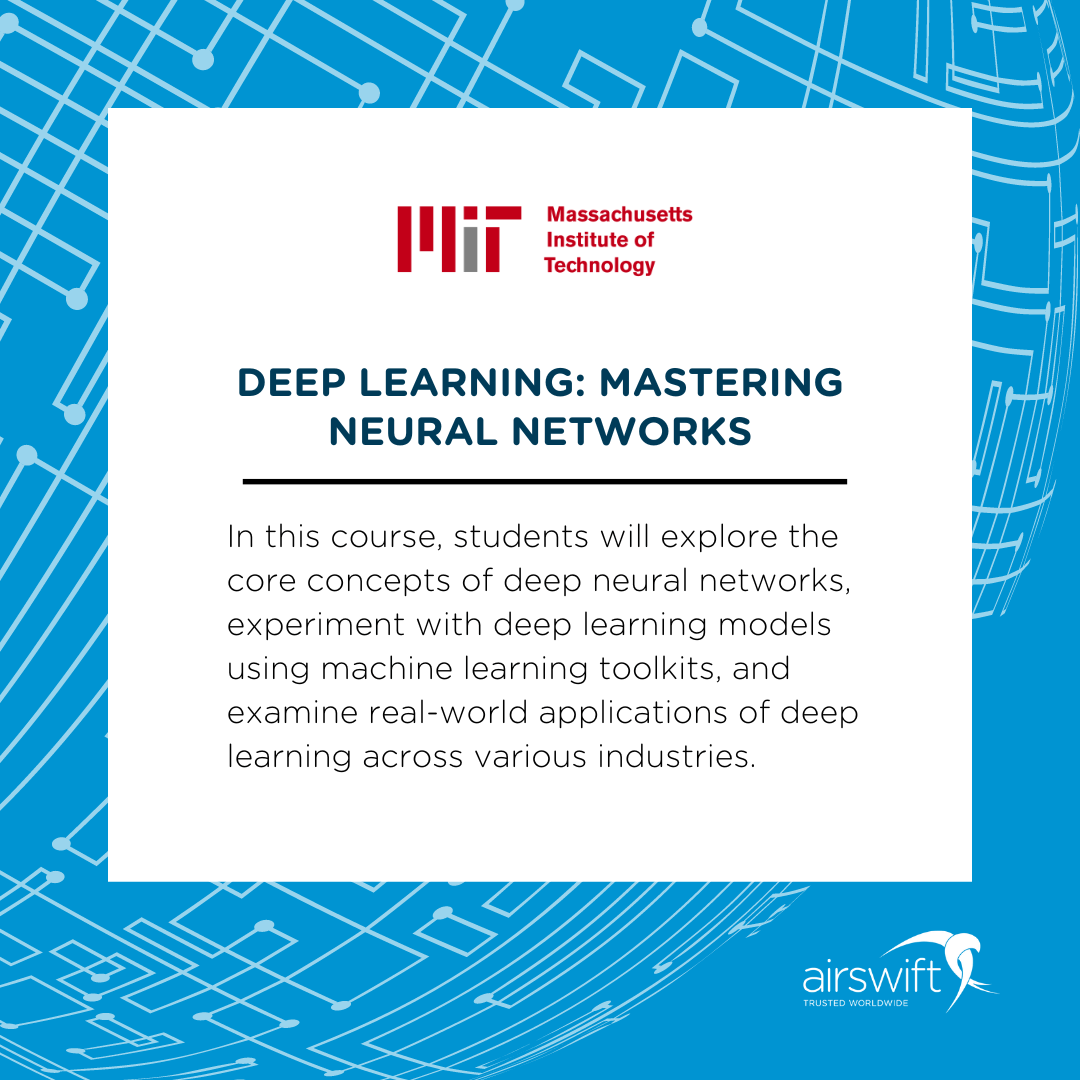
5. "Natural Language Processing" offered by Université de Lorraine.
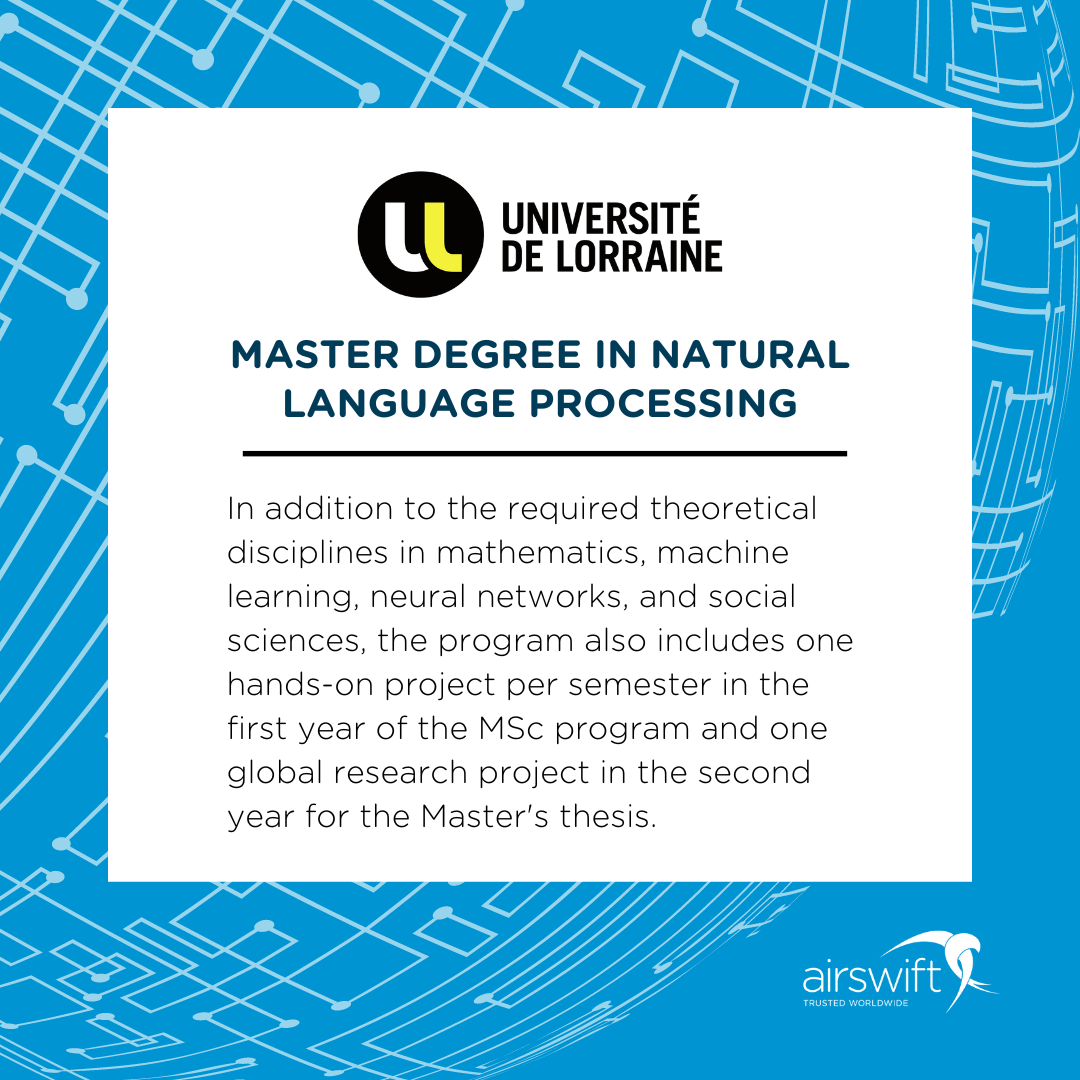
Overall, a combination of formal education, practical knowledge, and continuous learning can open up various career opportunities for those aspiring to become AI engineers.
The average salary of an AI engineer
AI engineers are among the highest-paid professionals in the tech industry. However, the average salary can vary depending on variables such as experience level and the sector in which you are employed, such as the energy niche.
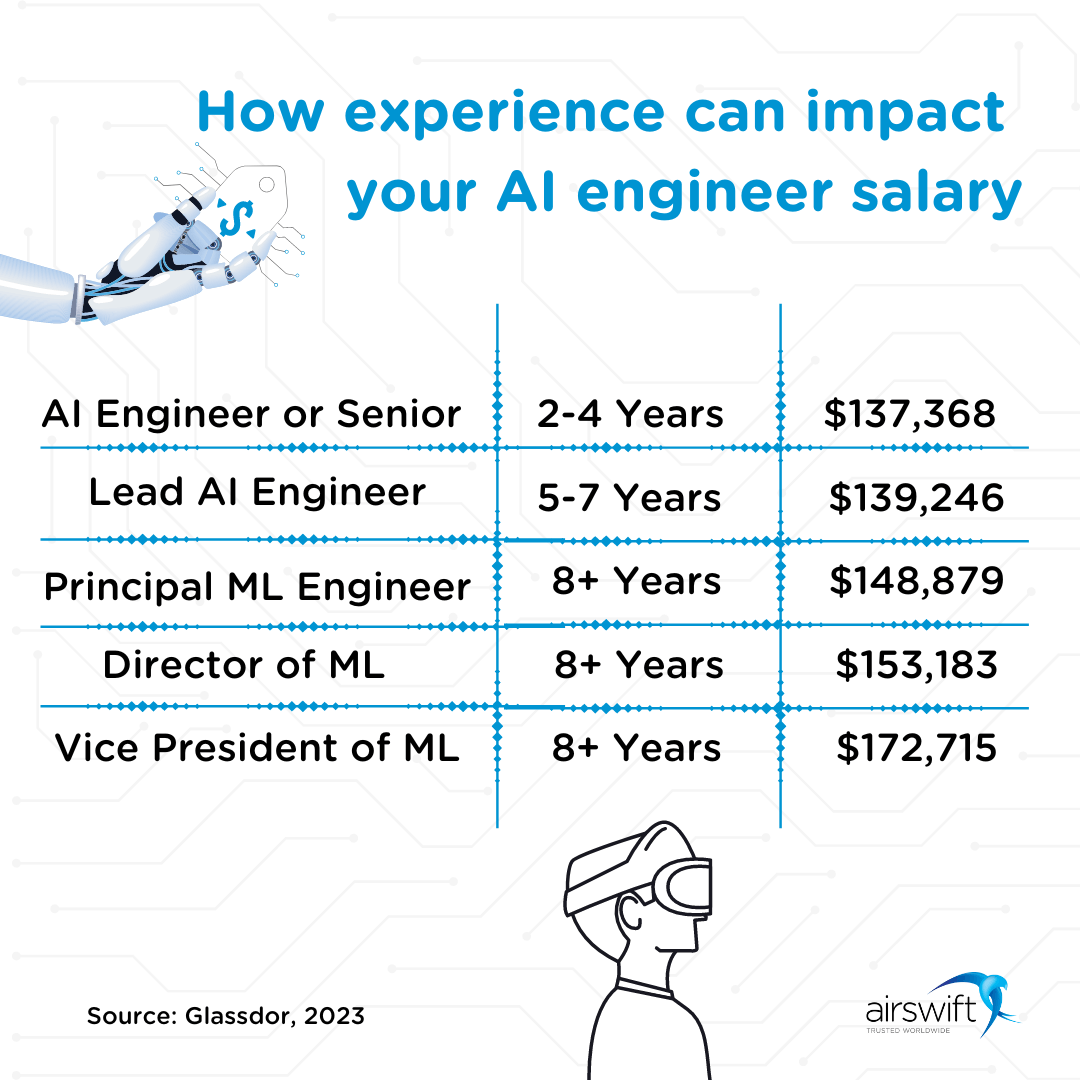
Find your dream job in the AI with Airswift
In conclusion, with the right skills and guidance, you can become one of the most sought-after AI engineers in the industry. And when it comes to finding your dream job in AI engineering, Airswift is here to help.
With more than 9,000 contractors and over 60 offices worldwide, our expertise and extensive network can connect you with the best opportunities and ensure that you land your dream job. So don't wait any longer; take the next step towards your AI engineering career with us.

